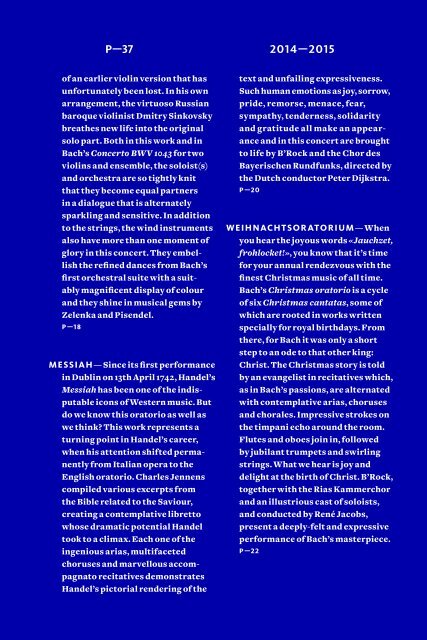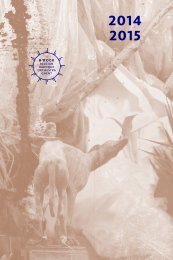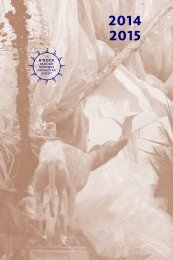Create successful ePaper yourself
Turn your PDF publications into a flip-book with our unique Google optimized e-Paper software.
P—37<br />
2014—2015<br />
of an earlier violin version that has<br />
unfortunately been lost. In his own<br />
arrangement, the virtuoso Russian<br />
baroque violinist Dmitry Sinkovsky<br />
breathes new life into the original<br />
solo part. Both in this work and in<br />
Bach’s Concerto BWV 1043 for two<br />
violins and ensemble, the soloist(s)<br />
and orchestra are so tightly knit<br />
that they become equal partners<br />
in a dialogue that is alternately<br />
sparkling and sensitive. In addition<br />
to the strings, the wind instruments<br />
also have more than one moment of<br />
glory in this concert. They embellish<br />
the refined dances from Bach’s<br />
first orchestral suite with a suitably<br />
magnificent display of colour<br />
and they shine in musical gems by<br />
Zelenka and Pisendel.<br />
P—18<br />
MESSIAH— Since its first performance<br />
in Dublin on 13th April 1742, Handel’s<br />
Messiah has been one of the indisputable<br />
icons of Western music. But<br />
do we know this oratorio as well as<br />
we think? This work represents a<br />
turning point in Handel’s career,<br />
when his attention shifted permanently<br />
from Italian opera to the<br />
English oratorio. Charles Jennens<br />
compiled various excerpts from<br />
the Bible related to the Saviour,<br />
creating a contemplative libretto<br />
whose dramatic potential Handel<br />
took to a climax. Each one of the<br />
ingenious arias, multifaceted<br />
choruses and marvellous accompagnato<br />
recitatives demonstrates<br />
Handel’s pictorial rendering of the<br />
text and unfailing expressiveness.<br />
Such human emotions as joy, sorrow,<br />
pride, remorse, menace, fear,<br />
sympathy, tenderness, solidarity<br />
and gratitude all make an appearance<br />
and in this concert are brought<br />
to life by B’Rock and the Chor des<br />
Bayerischen Rundfunks, directed by<br />
the Dutch conductor Peter Dijkstra.<br />
P—20<br />
WEIHNACHTSORATORIUM— When<br />
you hear the joyous words «Jauchzet,<br />
frohlocket!», you know that it’s time<br />
for your annual rendezvous with the<br />
finest Christmas music of all time.<br />
Bach’s Christmas oratorio is a cycle<br />
of six Christmas cantatas, some of<br />
which are rooted in works written<br />
specially for royal birthdays. From<br />
there, for Bach it was only a short<br />
step to an ode to that other king:<br />
Christ. The Christmas story is told<br />
by an evangelist in recitatives which,<br />
as in Bach’s passions, are alternated<br />
with contemplative arias, choruses<br />
and chorales. Impressive strokes on<br />
the timpani echo around the room.<br />
Flutes and oboes join in, followed<br />
by jubilant trumpets and swirling<br />
strings. What we hear is joy and<br />
delight at the birth of Christ. B’Rock,<br />
together with the Rias Kammerchor<br />
and an illustrious cast of soloists,<br />
and conducted by René Jacobs,<br />
present a deeply-felt and expressive<br />
performance of Bach’s masterpiece.<br />
P—22





